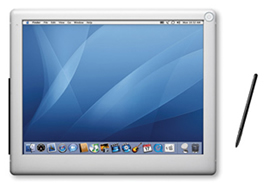Dude, where's my Apple Tablet PC?

Since playing with my friend’s Nintendo DS Lite, I’ve been totally convinced that touch screen displays will be the next major disruption to computer user interfaces. I was shocked not only by how fun and rewarding the games were but how the touch screen opened up so many possibilities for game play. I found myself instantly wanting a touch screen experience for my computer that offered the same level of creative thinking about the interface. Which led to one invariable conclusion, Apple needs to release a tablet based computer, and not one of these dinky UMPCs, I’m talking about a real computer.
Obviously, tablet based notebooks have been around for a while, but seem to have hardly reached their full potential. In one of my college lecture classes I frequently watched a student use is fancy tablet notebook to play solitaire during class; and I have to say it was an awesome interface for solitaire, but that seemed to be about it... For some strange reason tablet computers are marketed as business tools which is odd, because most business applications (word, excel, e-mail) have little to gain by a tablet interface. But they are slick little machines that seem effective at impressing clients and intimidating competitors.
Which led me to my next major conclusion: all prior thinking on tablet based computers is wrong. A touch screen computer interface holds the greatest benefit for creative applications, reducing the learning curve to new users, and in settings where a desk (or even a chair for that matter) is not available or desirable. The immediacy of touching the thing on the screen you want to affect is incredibly natural and obvious, in ways that are easy to ignore or downplay for the mouse and screen generation, as are the possible physical postures that a tablet PC could afford.
Graffiti is dead
At the top of the list of ideas that need to be thrown out is the idea that some form of handwriting recognition is acceptable (or desirable) for text input. Obviously, this is a big deal; no one wants to deal with a computer that makes entering text slow and cumbersome. On screen keyboards are usually one of the first thing offered up, and by in large they’re pathetic. However, TenGo’s on-screen keyboard for PDAs finally offers some impressive (and yet obvious) improvements over on-screen keyboards. First, it offers word prediction (duh…), so you rarely have to tap out a whole word. Second, it divides a standard QWERTY layout into 6 big keys, which are way easy to tap on. While I haven’t used the application first hand, TenGo clearly seem to be on to something.
Your finger is not a mouse
The next huge mistake of previous tablet computers is thinking that touch screen interfaces offer marginal benefits over a mouse. This has forced touch screen interfaces into (badly) emulating mouse functionality, which mostly cripples any unique benefits of the technology. While I won’t claim to offer the secrets for unlocking the potential of a touch screen interface, the TactaPad (check out the demo movies) offers some impressive functionality on a touch sensitive tablet, some of which should be possible to integrate into a tablet PC.
One dispairty between tablet PCs and mice that needs to be adressed is the variable cursor speed. With a mouse, quick physical movements are translated into longer cursor movements, and slow movements are translated into short cursor movements. This enables mice to achieve much more precise movements than a touch screen. A tablet computer needs to be able to yield equally precise movements.
The “True” Video iPod
The next iteration of Apple’s iPod is rumored to sport a touch screen that covers the entire front of the device. If this is true, this will be Apple’s first major product to use a touch sensitive display since the Newton. Also, I’m sure deep in Apple’s skunk works are several touch screen based computers. Hopefully, the rumors of a touch screen iPod will be true, and the success of the product will propel a touch screen PC (or even just a standalone touch screen) out of development and into mass production. Given the steadily dropping price of LCD displays the economics of a touch screen display may finally work out. Plus, if any company can unlock the potential of a touch screen computer, it’s Apple. They dented the universe with the first modern GUI, and I think it’s time for another dent.
Comments
keep up the good work
Posted by: Kanye | June 16, 2007 08:40 AM